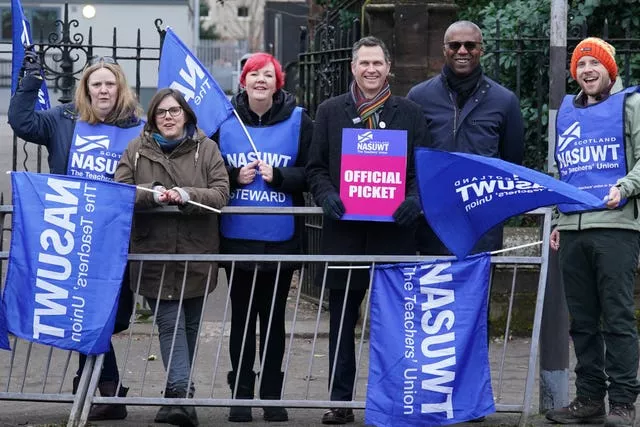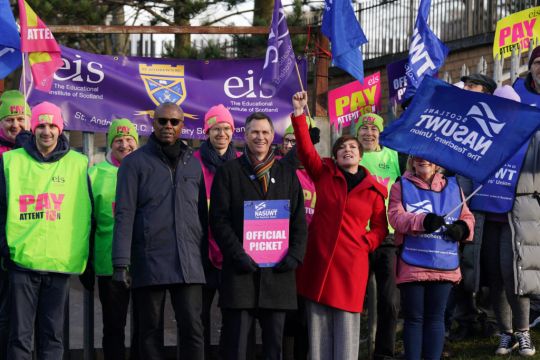A second teaching union in Scotland has warned its members could take more strike action if the long-running pay dispute is not resolved.
Children are again missing lessons as many schools around the country are closed on Wednesday for the second day in a row as members of the NASUWT and Educational Institute of Scotland (EIS) unions walked out in the latest national strike action.
It follows national strike action involving several unions in January and late last year.
The EIS, which also staged 16 days of rolling strike action from mid-January into early February and three days of “targeted” walkouts last week, has announced a new 20-day wave of rolling strikes between March 13th and April 21st.

The NASUWT has not announced any further strike dates, however Mike Corbett, its national official for Scotland, said there is “certainly potential” for more walkouts, though members would be “reluctant” to disrupt exam season.
Speaking on a picket line outside Rosshall Academy in Glasgow, he told the PA news agency: “Our strike action programme was up to and including today and I suppose our action committee probably hoped that that would be enough and we would have resolved the dispute by now, but it doesn’t look like we have, so our action committee will meet again and review where we’re at.
“We do have a programme of action short of strike action in schools at the moment so that’s there still to try and put pressure on employers to come to a resolution to the dispute.
“Certainly there’s potential for more strike action, obviously in a secondary school like the one we’re standing outside we’ve got exam season coming after Easter, and we would be reluctant I think to disrupt exam season, disrupt exams and the pupils’ potential achievements.”
Granton PS still standing strong on day 2 of strike action. If the Scottish Government value children and their futures they MUST value education. To value education they MUST value teachers. We WANT to teach and we DESERVE fair pay. #PayAttention @EISUnion @EdinburghEIS @COSLA pic.twitter.com/fvNrxLzeeY
— Ms Ramm (@MsRamm_Primary) March 1, 2023
Under the latest offer announced by Scottish education secretary Shirley-Anne Somerville last month, teachers earning up to £80,000 would have a 6 per cent pay rise from April 2022, and then another 5.5 per cent from the start of the 2023 financial year.
Mr Corbett said an “improved offer” is needed to resolve the dispute, and if the union receives an offer it feels is a “significant improvement”, this will be put to members for them to decide on.
He said: “Our members are still solidly behind the strike action at the moment. There was a revised offer put out to the teaching unions on February 14th, so we did put that to our members, and a clear majority rejected that offer, said it’s still not enough.
“Although I know the cabinet secretary likes to add the figure together for the two years and say you’re getting an 11.5 per cent offer, our members are looking at inflation, and the fact if you put those two figures together, inflation last year and the coming year together, that’s over 20 per cent.
“So the point they’ve made all along, a significant real-terms pay cut is still what they’re facing and why they’re still out on picket lines today across the country and saying that they need a better offer from government and employers.”
He said the union has not heard from the Scottish government regarding further talks but added the NASUWT is always happy to sit down at the table for negotiations.

NASUWT general secretary Patrick Roach was at the picket line with Mr Corbett.
The EIS union is calling for a 10 per cent increase which the Scottish government has said is unaffordable.
Members of the Scottish Secondary Teachers’ Association (SSTA) agreed to defer this week’s industrial action after a member survey found they would very marginally vote in favour of accepting the latest offer.
The Association of Headteachers and Deputies in Scotland (AHDS) also cancelled its planned participation in further strikes after a majority voted in favour of accepting the deal.
Ms Somerville has said the disruption to young people’s education is “completely unacceptable”.
She said: “I have asked the teaching unions to resume pay talks urgently. I am offering meetings with the deputy first minister or myself each and every day this week, if necessary, to make progress on this.”







